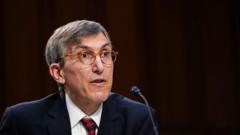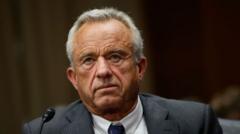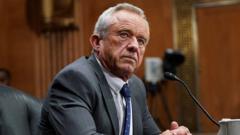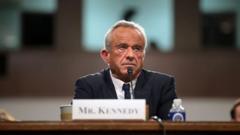The controversial new DHHS leader aims to combat ultra-processed foods and industry norms, while facing significant political and regulatory challenges.
RFK Jr's Ambitious Food Reform Agenda: Can It Make America Healthy Again?
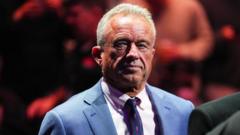
RFK Jr's Ambitious Food Reform Agenda: Can It Make America Healthy Again?
Kennedy's commitment to reforming the American food system is met with both support and skepticism.
Robert F. Kennedy Jr. is embarking on a bold initiative aimed at transforming American dietary habits amid growing concerns over the prevalence of unhealthy food choices. With a focus on removing ultra-processed foods from the market, Kennedy’s agenda as the nominee for the Department of Health and Human Services (DHHS) hinges on reshaping food regulations that he believes compromise public health.
Kennedy's critique extends to various products, citing specific ingredients in popular items, from the dyes in cereals to unhealthy oils prevalent in fast foods. His rhetoric intensified after recent rallies, where he lamented, "We are betraying our children by allowing food industries to poison them." However, this proposed shift is not without obstacles. Industry giants, collectively referred to as Big Food, wield significant influence over policy and regulation.
The selection of Kennedy has sparked debates, considering his controversial history as an environmental lawyer with a penchant for unverified health claims, notably around vaccines. Despite this, his proposed reforms resonate with certain sections of the political aisle, including some Democrats. Colorado Governor Jared Polis even commended Kennedy's potential to revitalize HHS and FDA policies aimed at chronic disease prevention, although he later added that scientific rigor must remain the foundation of health initiatives.
Under the slogan "Make America Healthy Again," Kennedy's platform also encompasses eliminating ultra-processed foods frequently linked to serious health conditions such as diabetes and cancer. Acknowledging the alarming state of children's diets, he emphasized the urgent need to reform school lunches, viewing this as a critical battleground in the fight against childhood health issues.
As he prepares to oversee the FDA, Kennedy faces the agency's administrative complexities: managing more than 18,000 staff dedicated to ensuring food safety and pharmaceuticals in the U.S. The FDA has recently faced scrutiny over its transparency and effectiveness, which may bolster his call for sweeping changes. Kennedy has expressed a desire for substantive reform, including dismissing perceived corrupt officials and overhauling outdated food guidelines.
His proposals often hinge on contentious issues within public health discourse—such as banning certain food dyes currently permitted in the U.S. but outlawed in Europe. While many public health experts see potential benefits in Kennedy’s initiatives, skepticism persists regarding the practicality and safety of some recommendations. For instance, claims surrounding raw milk's health benefits face criticism from health professionals who warn against its associated risks without pasteurization.
Moreover, Kennedy's focus on seed oils and fluoride in drinking water faces pushback from experts who dispute the scientific basis of his assertions. The complexity of U.S. food regulation adds to the challenges; Kennedy's mandate would require collaboration among various governmental departments and could encounter fierce industry backlash.
Experts worry that Kennedy's ambitious goals risk being undermined by formidable political realities. The alignment with President-elect Trump's existing policies—who is known for championing fast food and rolling back health regulations—presents further uncertainty regarding the likelihood of effective reform. Advocacy groups within the food industry have already voiced their concerns, indicating potential pushback against heightened scrutiny and regulation.
However, pathways for actionable reforms do exist. Some suggest that Kennedy could work within current frameworks by influencing FDA guidelines for nutrition and food safety. The U.S. Dietary Guidelines, which influence national food policies significantly, represent an opportunity for Kennedy to effect change.
Ultimately, Kennedy's dual reputation as both a health advocate and a controversial figure complicates the narrative surrounding his ambitions. While there is undeniable momentum toward a health-centric dialogue regarding American dietary habits, reconciling his more dubious health claims with serious nutritional strategies remains a critical hurdle. Observers note that while Kennedy's intentions spark necessary debates, his approach may require recalibration for real-world effectiveness.











